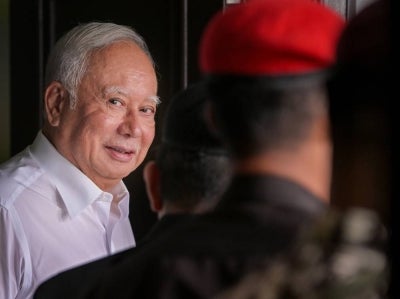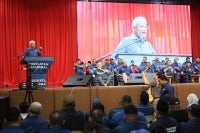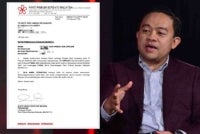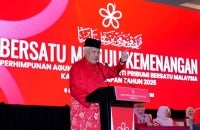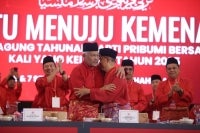Malaysian traders strive to support the B40 community through 'Menu Rahmah' despite challenges

SHAH ALAM - Ever since the implementation of Menu Rahmah, traders have been facing challenges in maintaining their businesses, however, they are steadfast in highlighting the importance of persisting with this initiative to aid the B40 group, which includes economically marginalised communities.
Tomyam Entrepreneurs Association Malaysia Advisor Che Mamat Che Mod has previously acknowledged the challenges encountered by food traders due to rising commodity prices.
Che Mamat Che Mod, the advisor of the Tomyam Entrepreneurs Association Malaysia, previously acknowledged the challenges encountered by food traders due to rising commodity prices.
Nonetheless, he emphasised the significance of adhering to the legacy of the late Domestic Trade and Cost of Living Minister Datuk Seri Salahuddin Ayub, who passed away on July 23 and had introduced the 'Menu Rahmah' incentive for Malaysians.
Salahuddin, 61, died at Hospital Sultanah Bahiyah in Alor Setar on July 23 after undergoing surgery for a brain haemorrhage the day before.
“From the beginning, we Tomyam traders have felt that we are unable to continue offering Menu Rahmah due to the increase in the prices of goods.
“However, because the late Salahuddin said that this will help the B40 group ease their burden, why not?,” he told Sinar Daily.
Although Menu Rahmah may not be actively sought by every sector of society, he said it is crucial for groups involved in the industrial and construction fields, such as the B40, who derive significant benefits from this programme.
“Not everyone chooses Menu Rahmah; some also come to the restaurant to order other items. InshaAllah, we will survive.
“I, as a trader, am committed to continuing Menu Rahmah as an act of charity. I believe that with every blessing we receive, there is also a blessing for others,” he said.
The Malaysian Muslim Restaurant Owners Association (PRESMA) president also echoed similar sentiments, saying it was his personal dedication to offer Menu Rahmah and, at the same time, encourage other traders to do the same.
He acknowledged the difficulties arising from the cost differences, with Menu Rahmah being priced at RM 5 despite the actual cost being RM 8 per plate.
"Nevertheless, I would like to stress the significance of helping the rakyat, and I also urge the government to back businesses that uphold this initiative.
Mydin managing director, Datuk Ameer Ali Mydin, reassured the rakyat that Mydin has no intention of increasing the prices of Menu Rahmah, despite the escalating costs of goods and raw materials.
"We are aware that the increase in the prices of goods will not ease. Especially now, there is no local rice available, and we have to use imported rice priced at RM38 for 10 kilogrammes (kg),” he said.
However, he also affirmed Mydin's commitment to assist the B40 group and all Malaysians by ensuring that this affordable menu option remains accessible.
“So in our calculations, the cost of one plate of Menu Rahmah rice has increased by 12 cents. This is only considering the increase in rice prices, not to mention the increases in eggs and vegetables.
“But, at Mydin, we are maintaining this price. I hope our colleagues out there will also maintain the Rahmah price because this is a corporate social responsibility (CSR) to the Malaysian people, especially to help the less fortunate B40 group.
“Our primary goal is to assist the people and to support the commodities accessible to the B40 group and all Malaysians," he added.
Ameer Ali also expressed confidence that other major retailers share the same commitment to not raise Menu Rahmah prices.
“I understand that small traders may find it a bit challenging, but for larger businesses, it is hoped that they will continue this Menu Rahmah initiative," he said.
Meanwhile, Tahirah Mat Waijar, a restaurant owner of Mameen Celup Tepung Selambak at Shah Alam, shared her perspective on offering Menu Rahmah, claiming that it is such a promotional tool for her restaurant to grab the customer’s attention.
“Here, in my restaurant, I also offer a kids' menu at RM5 and strive to provide options for budget-conscious customers.
“Despite the financial challenges and cost considerations, Malaysian traders and restaurant owners are resolute in their commitment to Menu Rahmah.
“Their dedication to assisting the B40 group and providing affordable meals reflects the spirit of solidarity and charity, underscoring the importance of community support during times of economic hardship,” she expressed.
She further elaborated that in considering the practice of offering low-priced Menu Rahmah, it becomes apparent that this approach may not align with the long-term sustainability goals of traders, who, fundamentally, aim to generate profits.
“Recognising that there is a segment of customers actively seeking affordable dining options, this initiative serves as a viable choice for the rakyat.
“Ultimately, this approach not only appeals to those looking to dine on a budget but also accommodates patrons who prioritise their dining experience over the price tag, thereby contributing to the restaurant's overall success,” she added.
The Ministry of Agriculture and Food Security (MAFS) anticipated that the scarcity of local white rice in the market would stabilise within a month, thanks to the various intervention measures and continuous monitoring from the government.
Download Sinar Daily application.Click Here!




